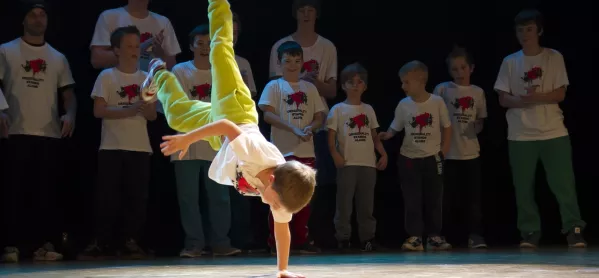-During my 15 years of headship, one of the decisions I was most proud of was when our school became a local hub for hearing-impaired children. We were able to provide specialist tutors, equipment and facilities so that a small group of pupils could take part in the same lessons and sit in the same assemblies as every other child. As someone who had completely lost my hearing in one ear aged 11, I felt a special affinity for these pupils.
One year, we had four boys in the same year group. They were happy, sociable, eager to do well. I would see them in maths or geography, working with a teaching assistant who was signing the teacher’s message and benefiting from the teacher wearing the microphone that transmitted her words to a hearing loop. The pupils thrived.
When they reached year 10, the boys all opted to take GCSE dance, a subject we had introduced a couple of years earlier. They evidently loved these lessons and I’d drop in to watch them. What I saw was not the boys who were deaf. They were simply the humans who danced.
Liberated by movement, by that mix of creativity, self-expression and discipline that dance brings, these young men inspired the school, its staff and its pupils.
I saw then what so many parents know when we drive our children to a Saturday drama club or dolefully wonder whether buying their child that drum kit was such a good decision. We know that music and theatre and dance and drama and art are far, far more than “enrichment” subjects. That word suggests they are vaguely peripheral. It trivialises their importance.
Instead to many of us, in school and in the world beyond, the arts are one of the pre-eminent achievements of the human race, by turns uplifting, emotionally nourishing, challenging and spiritual, and the birthright of our children - all our children, irrespective of background.
The arts matter and have also been a presiding feature of the UK’s education system for much of its recent history. For many of us, we wouldn’t contemplate sending our children to a school - maintained, academy or independent - if it didn’t have a choir, an orchestra of some kind, drama productions, dance shows and art exhibitions.
Show me a great school and I’ll show you a rich pulsing culture of the arts at its core. It’s what we do and has made our schools the envy of so much of the world.
That’s what makes last week’s report from the Education Policy Institute so bleakly disturbing. Entries to Art Subjects at Key Stage 4 charts the decline in arts provision in state schools and - with characteristically forensic dispassion - highlights the following:
- Entries to arts subjects by KS4 cohorts have declined over the past couple of years, following several years of gradual increases, with the 2016 entry rate falling to the lowest of the decade.
- The proportion of pupils taking at least one arts subject declined from 57.1 per cent in 2014 to 53.5 per cent in 2016. Again, this followed an increase from 55.6 per cent in 2010.
- If the same proportion of pupils had taken at least one arts entry in 2016 as in 2014, then around 19,000 more pupils would have taken an arts subject.
- Provisional data relating to 2017 exam entries indicate that the decline is continuing.
No school wants to reduce arts provision of course. The sad reality is that this situation is the result of a pincer grip of external pressures. An accountability system that measures success chiefly on a narrow range of academic subjects, and a funding crisis that makes smaller subjects difficult to sustain.
Nevertheless, it is happening on our collective watch. Even if the government has its head buried firmly in the sand over this issue, we, as a profession, must continue to shout out about the importance of the arts in our schools.
We must campaign for an accountability system which better recognises these subjects, argue for the resources that underpin them and do everything we can to preserve them.
Because the children we are fighting for the most may well be those from backgrounds who, without us, will have the least access in their home lives to what we can too easily take for granted - the liberating, humanising, intoxicating power of the arts.
Geoff Barton is general secretary of the Association of School and College Leaders. He tweets @RealGeoffBarton
Want to keep up with the latest education news and opinion? Follow Tes on Twitter and like Tes on Facebook




